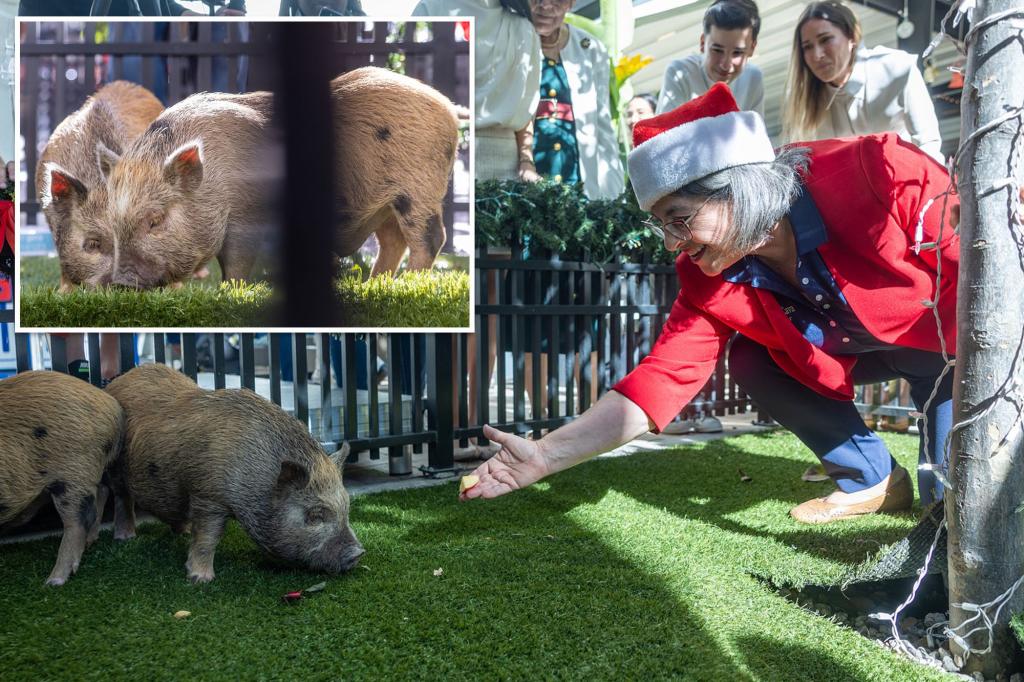The bustling city of Miami, known for its vibrant culture and eclectic culinary scene, recently witnessed a heartwarming, albeit slightly unusual, ceremony: the pardoning of two baby pigs. Glinda and Elphaba, named after the iconic witches from the musical “Wicked,” were granted an official reprieve from becoming the centerpiece of a traditional Cuban Christmas Eve dinner, known as Nochebuena. This annual tradition, a playful spin on the presidential Thanksgiving turkey pardon, has become a beloved event in South Florida, offering a lighthearted moment amidst the holiday hustle and bustle. While turkeys take center stage in the national Thanksgiving narrative, pork, specifically roasted pig or “lechon asado,” reigns supreme in Miami’s Cuban-American community during the Christmas season. This cultural nuance underscores the significance of the pig pardoning ceremony, transforming it into a unique expression of local tradition.
The pardoning itself took place outside Latin Cafe 2000, the restaurant that conceived and continues to sponsor this seven-year-old tradition. Mayor Daniella Levine Cava presided over the ceremony, presenting the official proclamation that granted Glinda and Elphaba permanent amnesty from the barbecue pit. The four-month-old piglets, resembling “pudgy beagles,” seemed largely indifferent to the fanfare surrounding them. Their attention was primarily captivated by the offerings of apple and orange slices, and the persistent, yet ultimately futile, attempts to nibble on the plastic grass lining their temporary enclosure. The crowd, gathered to witness this peculiar display of clemency, shared a moment of levity and perhaps a renewed appreciation for the sometimes-unseen connections between food, culture, and tradition.
The genesis of this unique tradition lies in a playful observation by the staff at Latin Cafe 2000. After witnessing news coverage of the presidential turkey pardon, they noted the stark contrast with Miami’s culinary preferences. Turkey, a Thanksgiving staple elsewhere, takes a backseat to the beloved roasted pig in Miami’s Cuban-American community. This realization sparked a humorous suggestion: why not pardon a pig instead? Restaurant owner Eric Castellanos embraced the idea, and what began as a jest among colleagues quickly evolved into a cherished annual event. The responsibility of naming the pardoned piglets falls upon Castellanos’ children, adding a touch of family tradition to the proceedings. This year, the chosen names, Glinda and Elphaba, brought a touch of theatrical flair to the occasion.
The pig pardoning ceremony attracts a diverse crowd, drawn by the unusual spectacle and the opportunity to engage with a unique aspect of Miami’s cultural tapestry. Abbi Erkes, a recent transplant from the Midwest, attended the event as part of her ongoing immersion into Miami’s vibrant Latin culture. For Erkes, the experience offered a charming introduction to the local customs, highlighting the importance of food and tradition in the community. The ceremony serves as a bridge between cultures, inviting newcomers and long-time residents alike to celebrate the city’s rich and diverse heritage. The pardoned pigs, therefore, become more than just agricultural commodities; they transform into symbols of community, tradition, and the playful spirit that permeates Miami’s cultural landscape.
Following the ceremony, Glinda and Elphaba embarked on their journey to a new life at an animal sanctuary south of Miami, joining a growing cohort of pardoned pigs – the 12th and 13th to receive this honor. Their fate stands in stark contrast to the thousands of pigs destined for the Christmas Eve feasts across South Florida and beyond. These pigs, prepared in various ways – roasted whole in underground pits, on spits, or in specialized metal boxes – form the heart of the Nochebuena tradition, a culinary centerpiece deeply ingrained in Cuban culture. The pardoning of Glinda and Elphaba serves as a gentle reminder of the lives behind the meals, offering a moment of reflection amidst the festive celebrations.
The Miami pig pardoning ceremony, while lighthearted in nature, carries a deeper significance. It highlights the intersection of food, culture, and community, offering a unique lens through which to understand the vibrant tapestry of Miami’s traditions. The pardoned pigs, Glinda and Elphaba, become symbolic ambassadors, representing not only the importance of animal welfare but also the playful spirit and cultural richness that define the city. Their story, a whimsical departure from the traditional holiday narrative, serves as a testament to Miami’s unique cultural identity and its embrace of the unexpected. The plastic grass, remaining stubbornly uneaten, stands as a silent testament to their brief encounter with the spotlight, a quirky detail in a heartwarming tale of tradition, community, and two very fortunate pigs.

